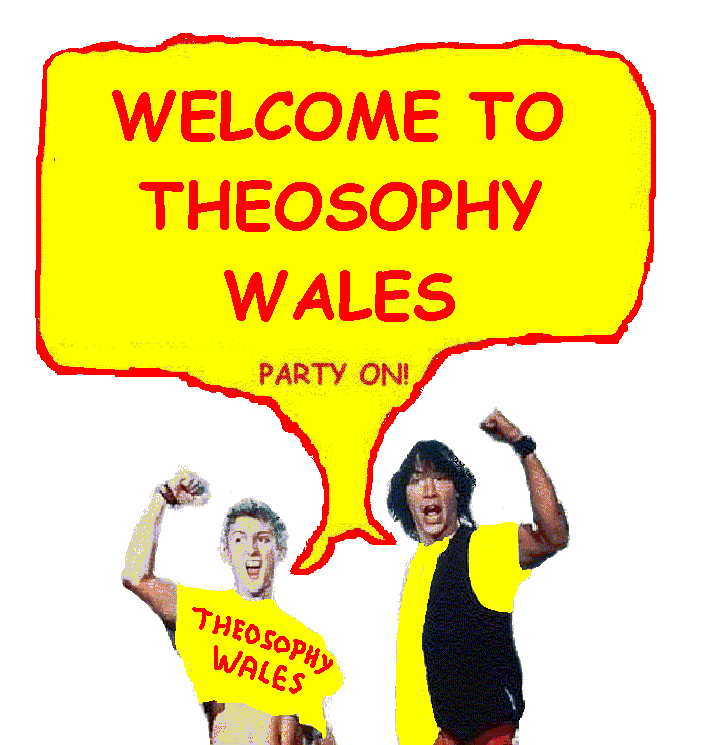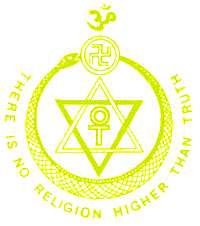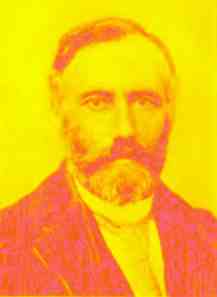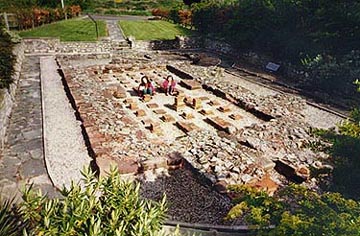

____________
THE
OF
THEOSOPHY

A Definitive Work on Theosophy
By
William Quan Judge

CHAPTER 10
Arguments
Supporting Reincarnation
Unless we deny the immortality of man and the existence of soul, there
are no sound arguments against the doctrine of pre-existence and rebirth save
such as rest on the dictum of the church that each soul is a new creation. This
dictum can be supported only by blind dogmatism, for given a soul we must
sooner or later arrive at the theory of rebirth, because even if each soul is
new on this earth it must keep on living somewhere after passing away, and in
view of the known order of nature will have other bodies in other planets or
spheres.
Theosophy
applies to the self -- the thinker -- the same laws which are seen everywhere
in operation throughout nature, and those are all varieties of the great law
that effects follow causes and no effect is without a cause.
The soul's immortality -- believed in by the mass of humanity -- demands
embodiment here or elsewhere, and to be embodied means reincarnation. If we come
to this earth for but a few years and then go to some other, the soul must be
reimbodied there as well as here, and if we have travelled from some other
world we must have had there too our proper vesture. The powers of mind and the
laws governing its motion, its attachment, and its detachment as given in
theosophical philosophy show that its reimbodiment must be here, where it moved
and worked, until such time as the mind is able to overcome the forces which
chain it to this globe. To permit the involved entity to transfer itself to
another scene of action before it had overcome all the causes drawing it here
and without its having worked out its responsibilities to other entities in the
same stream of evolution would be unjust and contrary to the powerful occult
laws and forces which continually operate upon it. The early Christian Fathers
saw this, and taught that the soul had fallen into matter and was obliged by
the law of its nature to toil upward again to the place from which it came.
They used an old
Greek hymn which ran:
†
† Eternal Mind, thy seedling
spark,
† Through this thin vase of clay,
† Athwart the waves of chaos dark
† Emits a timorous ray.
† This mind enfolding soul is
sown,
† Incarnate germ in earth:
† In pity, blessed Lord, then own
† What claims in Thee its birth.
† Far forth from Thee, thou
central fire,
† To earth's sad bondage cast,
† Let not the trembling spark
expire;
† Absorb thine own at last!
Each human being has a definite character different from every other
human being, and masses of beings aggregated into nations show as wholes that
the national force and distinguishing peculiarities go to make up a definite
and separate national character. These differences, both individual and
national,
are due to essential character and not to education.
Even the doctrine of the survival of the fittest should show this, for
the fitness can not come from nothing but must at last show itself from the
coming to the surface of the actual inner character. And as both individuals
and nations among those who are ahead in the struggle with nature exhibit an
immense force in their character, we must find a place and time where the force
was evolved.
These, Theosophy
says, are this earth and the whole period during which the human race has been
on the planet.
So, then, while heredity has something to do with the difference in
character as to force and morale, swaying the soul and mind a little and furnishing
also the appropriate place for receiving reward and punishment, it is not the
cause for the essential nature shown by every one.
But all these differences, such as those shown by babes from birth, by
adults as character comes forth more and more, and by nations in their history,
are due to long experience gained during many lives on earth, are the outcome
of the soul's own evolution.
A survey of one short human life gives no ground for the
production of his inner nature. It is needful that each soul should have
all possible experience, and one life cannot give this even under the best
conditions.
It would be folly for the Almighty to put us here for such a short time,
only to remove us just when we had begun to see the object of life and the possibilities
in it. The mere selfish desire of a person to escape the trials and discipline
of life is not enough to set nature's laws aside, so the soul must be reborn
until it has ceased to set in motion the cause of rebirth, after having
developed character up to its possible limit as indicated by all the varieties
of human nature, when every experience has been passed through, and not until
all of truth that can be known has been acquired. The vast disparity among men
in respect to capacity compels us, if we wish to ascribe justice to Nature or
to God, to admit reincarnation and to trace the origin of the disparity back to
the past lives of the Ego. For people are as much hindered and handicapped,
abused and made the victims of seeming injustice because of limited capacity,
as they are by reason of circumstances of birth or education.
We see the uneducated rising above circumstances of family and training,
and often those born in good families have very small capacity; but the
troubles of nations and families arise from want of capacity more than from any
other cause.
And if we consider savage races only, there the seeming injustice is
enormous. For many savages have good actual brain capacity but still are
savage. This is because the Ego in that body is still savage and undeveloped,
for in contrast to the savage there are many civilized men with small actual
brain force who are
not savage in nature because the indwelling Ego has had long experience
in civilization during other lives, and being a more developed soul has power
to use the brain instrument to its highest limit.
Each man feels and knows that he has an individuality of his own, a
personal identity which bridges over not only the gaps made by sleep but also
those sometimes supervening on temporary lesions in the brain. This identity
never breaks from beginning to end of life in the normal person, and only the
persistence and eternal character of the soul will account for it.
So, ever since we began to remember, we know that our personal identity
has not failed us, no matter how bad may be our memory.
This disposes of the argument that identity depends on recollection, for
the reason that if it did depend alone on recollection we should each day have
to begin over again, as we cannot remember the events of the past in detail,
and some minds remember but little yet feel their personal identity. And as it
is often seen that some who remember the least insist as strongly as the others
on their personal identity, that persistence of feeling must come from the old
and immortal soul.
Viewing life and its probable object, with all the varied experience
possible for man, one must be forced to the conclusion that a single life is
not enough for carrying out all that is intended by Nature, to say nothing of
what man
himself desires to do. The scale of variety in experience is enormous.
There is a vast range of powers latent in man which we see may be developed if
opportunity be given. Knowledge infinite in scope and diversity lies before us,
and especially in these days when special investigation is the rule. We
perceive
that we have high aspirations with no time to reach up to their measure,
while the great troop of passions and desires, selfish motives and ambitions,
war with us and among themselves, pursuing us even to the door of death.
All these have to be tried, conquered, used, subdued. One life is not
enough for all this. To say that we have but one life here with such
possibilities put before us and impossible of development is to make the
universe and life a huge and cruel joke
perpetrated by a powerful God who is thus accused, by those who believe
in a special creation of souls, of triumphing and playing with puny man just
because that man is small and the creature of the Almighty.
A human life at most is seventy years; statistics reduce this to about
forty; and out of that little remainder a large part is spent in sleep and
another part in childhood. Thus in one life it is perfectly impossible to
attain to the merest fraction of what
Nature evidently has in view. We see many truths vaguely which a life
gives us no time to grasp, and especially is this so when men have to make such
a struggle to live at all. Our faculties are small or dwarfed or weak; one life
gives no opportunity to alter this; we perceive other powers latent in us that
cannot possibly be brought out in such a small space of time; and we have much
more than a suspicion that the extent of the field of truth is vastly
greater than the narrow circle we are confined to.
It is not reasonable to suppose that either God or nature projects us
into a body simply to fill us with bitterness because we can have no other
opportunity here, but rather we must conclude that a series of incarnations has
led to the present condition, and that the process of coming here again and
again must go on for the purpose of affording us the opportunity needed.
The mere fact of dying is not of itself enough to bring about
development of faculties or the elimination of wrong tendency and inclination.
If we assume that upon entering heaven we at once acquire all knowledge and
purity, then that state after death is reduced to a dead level and life itself
with all its discipline is shorn of every meaning. Some of the churches teach
of a school of discipline after death where it is impudently stated that the
Apostles themselves, well known to be ignorant men, are to be the teachers.
This is absurd and devoid of any basis or reason in the natural order. Besides,
if there is to be such subsequent discipline, why were we projected into life
at all? And why after the suffering and the error committed are we taken from
the place where we did our acts?
The only solution left is in reincarnation. We come back to earth
because on it and with the beings upon it our deeds were performed; because it
is the only proper place where punishment and reward can be justly meted out;
because here is the only natural spot in which to continue the struggle toward
perfection, toward the development of the faculties we have and the destruction
of the wickedness in us. Justice to ourselves and to all other beings demands
it, for we cannot live for ourselves, and it would be unjust to permit some of
us to escape, leaving those who were participants with us to remain or to be plunged
into a hell of eternal duration.
The persistence of savagery, the rise and decay of nations and
civilizations, the total extinction of nations, all demand an explanation found
nowhere but in reincarnation. Savagery remains because there are still Egos
whose experience is
so limited that they are still savage; they will come up into higher
races when ready.
Races die out because the Egos have had enough of the experience that
sort of race gives. So we find the red Indian, the Hottentot, the Easter
Islanders, and others as examples of races deserted by high Egos and as they
are dying away other souls who have had no higher life in the past enter into
the bodies of the race to go on using them for the purpose of gaining such
experience as the race body will give. A race could not possibly arise and then
suddenly go out. We see that such is not the case, but science has no
explanation; it simply says that this is the fact, that nations decay. But in
this explanation no account is taken of the inner man nor of the recondite
subtle and occult laws that unite to make a race. Theosophy shows that the
energy drawn together has to expend itself gradually, and therefore the
reproduction of bodies of the character of that race will go on, though the
Egos are not compelled to inhabit bodies of that sort any longer than while
they are of the same development as the race. Hence a time comes when the whole
mass of Egos which built up the race leaves it for another physical environment
more
like themselves. The economy of Nature will not permit the physical race
to suddenly fade away, and so in the real order of evolution other and less
progressed Egos come in and use the forms provided, keeping up the production
of new bodies but less and less in number each century.
These lower Egos are not able to keep up to the limit of the capacity of
the congeries of energies left by the other Egos, and so while the new set
gains as much experience as is possible the race in time dies out after passing
through its decay. This is the explanation of what we may call descending
savagery, and no other theory will meet the facts. It has been sometimes
thought by ethnologists that the more civilized races kill off the other, but
the fact is that in consequence of the great difference between the Egos
inhabiting the old race body and the energy of that body itself, the females
begin to be sterile, and thus slowly but surely the number of deaths exceeds
the births. China itself is in process of decay, she being now in the almost
stationary stage just before the rush downward.
Great civilizations like those of Egypt and Babylon have gone because
the souls who made them have long ago reincarnated in the great conquering
nations of Europe and the present American continents. As nations and races
they have been totally reincarnated and born again for greater and higher
purposes than ever.
Of all the old races the Aryan Indian alone yet remains as the preserver
of the old doctrines. It will one day rise again to its old heights of glory.
The appearance of geniuses and great minds in families destitute of these
qualities, as well as the extinction from a family of the genius shown by some
ancestor, can only be met by the law of rebirth. Napoleon the First came in a
family wholly unlike him in power and force. Nothing in his heredity will
explain his character. He said himself, as told in the Memoirs of Prince
Talleyrand, that he was Charlemagne. Only by assuming for him a long series of
lives giving the right line of evolution or cause for his mind and nature and
force to be brought out, can we have the slightest idea why he or any other
great genius appeared at all. Mozart when an infant could compose orchestral
score. This was not due to heredity, for such a score is not natural,
but is forced, mechanical, and wholly conventional, yet he understood it
without schooling. How? Because he was a musician reincarnated, with a musical
brain furnished by his family and thus not impeded in his endeavors to show
forth his
musical knowledge.
But stronger yet is the case of Blind Tom, a Negro whose
family could not by any possibility have a knowledge of the piano, a
modern instrument, so as to transmit that knowledge to the atoms of his body,
yet he had great musical power and knew the present mechanical musical scale on
the piano. There are hundreds of examples like these among the many prodigies
who have appeared to the world's astonishment. In India there are many
histories of sages born with complete knowledge of philosophy and the like, and
doubtless in all nations the same can be met with. This bringing back of
knowledge also explains instinct, for that is no more than recollection
divisible into physical and mental memory.
It is seen in the child and the animal, and is no more than the result
of previous experience. And whether we look at the new-born babe flinging out
its arms for self-protection, or the animal with very strong instinctual power,
or the bee building a cell on the rules of geometry, it is all the effect of
reincarnation acting either in the mind or physical cell, for under what was
first laid down no atom is devoid of life, consciousness, and intelligence of
its own.
In the case of the musician Bach we have proof that heredity counts for
nothing if the Ego is not advanced, for his genius was not borne down his
family line; it gradually faded out, finally leaving the family stream
entirely. So, too, the coming of idiots or vicious children to parents who are good,
pure, or highly
intellectual is explained in the same way. They are cases where heredity
is set at nought by a wholly bad or deficient Ego.
And lastly, the fact that certain inherent ideas are common to the whole
race is explained by the sages as due to recollection of such ideas, which were
implanted in the human mind at the very beginning of its evolutionary career on
this planet by those brothers and sages who learned their lessons and were
perfected in former ages long before the development of this globe
began. No explanation for inherent ideas is offered by science that will do
more than say, "they exist." These were actually taught to the mass
of Egos who are engaged in
this earth's evolution; they were imprinted or burned into their natures,
and always recollected; they follow the Ego through the long pilgrimage.
It has been often thought that the opposition to reincarnation has been
solely based on prejudice, when not due to a dogma which can only stand when
the mind is bound down and prevented from using its own powers. It is a
doctrine the most noble of all, and with its companion one of Karma, next to be
considered, it alone gives the basis for ethics. There is no doubt in my
mind that the founder of Christianity took it for granted and that its present
absence from that religion is the reason for the contradiction between the
professed ethics of Christian nations and their actual practises which are so
contrary to the morals given out by Jesus.
______________________
THE
OF
THEOSOPHY

Find out more about
Theosophy with these links

The Cardiff Theosophical Society Website
The National
Wales Theosophy Website
Theosophy
Wales Youtube Channel
Ten Benefits of Studying the Blavatskyan
Theosophical Teachings
Studying
the Blavatskyan Theosophical teachings offers numerous benefits that can
greatly enrich one's understanding of spirituality, philosophy, and the nature
of reality.† Theosophy, as defined by the
writings of Helena Petrovna Blavatsky, has had a profound impact on the
spiritual and philosophical landscape of the modern world. Blavatsky's
teachings draw from a wide range of religious and philosophical traditions,
including Hinduism, Buddhism, and Western esotericism, and present a
comprehensive worldview that addresses fundamental questions about existence,
consciousness, and the cosmos.
Here
are ten benefits of studying the Blavatskyan Theosophical Teachings
1.
Exploration of Esoteric Wisdom
One
of the primary benefits of studying the Blavatskyan Theosophical teachings is
the opportunity to explore esoteric wisdom that is often not readily accessible
in mainstream religious or philosophical traditions. Blavatsky's writings delve
into the esoteric teachings of ancient cultures and mystery schools, shedding
light on profound spiritual truths that have been passed down through the ages.
By delving into these esoteric teachings, students of Theosophy can gain
insights into the nature of consciousness, the structure of the cosmos, and the
evolution of the soul or immortal self.
2.
Synthesis of Eastern and Western Philosophy
Blavatsky's
Theosophical teachings synthesize elements of Eastern and Western philosophy,
offering a comprehensive framework that integrates concepts from diverse
cultural and religious traditions. This synthesis provides students with a
broader perspective on philosophical and spiritual thought, allowing them to
see the underlying unity of seemingly disparate belief systems. By studying
Theosophy, individuals can gain a deeper appreciation for the universal
principles that underlie all wisdom traditions, fostering a sense of unity and
interconnectedness with the world's spiritual heritage.
3.
Understanding of Universal Brotherhood
Central
to Blavatsky's Theosophical teachings is the principle of universal
brotherhood, which emphasizes the essential unity of all beings and the
interconnectedness of life. By studying Theosophy, individuals can develop a
profound understanding of the interconnected nature of existence, recognizing
that all living beings are fundamentally linked and that compassion and empathy
are essential for the evolution of humanity. This understanding can lead to a
greater sense of empathy, kindness, and social responsibility, fostering a more
harmonious and compassionate society.
4.
Insight into the Nature of Reality
The
Blavatskyan Theosophical teachings offer profound insights into the nature of
reality, consciousness, and the unseen dimensions of existence. Through the
study of Theosophy, individuals can explore concepts such as the
multi-dimensional nature of the universe, the existence of subtle energy
realms, and the interconnectedness of the material and spiritual planes. This
exploration can lead to a deeper understanding of the nature of reality beyond
the limitations of the physical senses, opening up new vistas of perception and
understanding.
5.
Personal Spiritual Growth
Studying
the Theosophical teachings can be a transformative journey that facilitates
personal spiritual growth and self-discovery. Blavatsky's writings offer
practical guidance for inner development, including meditation practices,
ethical principles, and the cultivation of spiritual virtues. By applying these
teachings to their lives, individuals can experience profound personal
transformation, leading to greater self-awareness, inner peace, and a sense of
purpose and meaning.
6.
Ethical and Moral Guidance
The Theosophical
teachings provide a comprehensive ethical and moral framework that can guide
individuals in their personal and social interactions. Blavatsky emphasizes the
importance of ethical conduct, altruism, and the pursuit of wisdom, offering
practical guidance for leading a virtuous and meaningful life. By studying
Theosophy, individuals can gain clarity on moral issues, cultivate a sense of
ethical responsibility, and contribute to the greater good of humanity.
7.
Appreciation of Comparative Religion
The
study of Theosophy encourages an appreciation of comparative religion and the
underlying unity of religious and spiritual traditions. Blavatsky's writings
explore the common threads that run through the world's religions, highlighting
universal spiritual principles that transcend cultural and historical
boundaries. By gaining a deeper understanding of comparative religion through
Theosophy, individuals can develop a more inclusive and pluralistic
perspective, fostering interfaith harmony and mutual respect.
8.
Intellectual Stimulation
The
Theosophical teachings offer a rich and intellectually stimulating framework
for exploring profound philosophical and metaphysical concepts. Blavatsky's
writings encompass a wide range of subjects, including cosmology, metaphysics,
ancient wisdom, and the evolution of consciousness, providing ample material
for intellectual inquiry and contemplation. By engaging with these teachings,
individuals can expand their intellectual horizons, develop critical thinking
skills, and gain a deeper understanding of the fundamental questions that have
intrigued philosophers and mystics throughout history.
9.
Healing and Reconciliation
The
Theosophical teachings offer insights into the nature of healing and
reconciliation, both on a personal and collective level. Blavatsky's writings
delve into the esoteric principles of healing, the nature of disease, and the
interconnectedness of mind, body, and spirit. By studying Theosophy,
individuals can gain a deeper understanding of holistic healing modalities, the
power of the mind in influencing health, and the potential for spiritual
transformation through the healing process. Furthermore, the Theosophical
emphasis on universal brotherhood and compassion can contribute to the
reconciliation of divisions and conflicts within society, fostering a more
harmonious and peaceful world.
10.
Contribution to Global Transformation
Finally,
studying the Blavatskyan Theosophical teachings can empower individuals to
contribute to the ongoing global transformation towards a more enlightened and
compassionate world. Blavatsky's vision of a spiritually awakened humanity,
working towards the betterment of all beings, inspires individuals to engage in
positive action and service to humanity. By embodying the principles of
Theosophy in their lives, individuals can become agents of positive change,
working towards the realization of a more just, peaceful, and sustainable
world.
In
summary, the study of the Blavatskyan Theosophical teachings offers a wide
range of benefits, ranging from personal spiritual growth to the potential for
global transformation. By delving into the esoteric wisdom, ethical principles,
and philosophical insights of Theosophy, individuals can expand their
understanding of the nature of reality, cultivate compassion and empathy, and
contribute to the evolution of humanity towards a more harmonious and
enlightened future. As the Theosophical teachings continue to inspire and guide
seekers of truth and wisdom, their profound impact on individuals and society
is likely to endure for generations to come.
If you run a Theosophy Group, please feel free
to use any of the material on this site
The Most Basic Theosophy
†Website in the Universe
A quick overview of Theosophy†
and the Theosophical Society
If you run a Theosophy Group you†
can use this as an introductory handout.
Theosophy Cardiffís Instant Guide
One liners and quick explanations
H P Blavatsky is
usually the only
Theosophist that
most people have ever
heard of. Letís
put that right
The Voice of the Silence Website
An Independent Theosophical Republic
Links to Free Online Theosophy†
Study Resources; Courses, Writings,†
The main criteria
for the inclusion of
links on this
site is that they have some
relationship
(however tenuous) to Theosophy
and are
lightweight, amusing or entertaining.
Topics include
Quantum Theory and Socks,
Dick Dastardly and Legendary Blues Singers.
A selection of
articles on Reincarnation
Provided in
response to the large†
number of enquiries
we receive at†
Cardiff
Theosophical Society on this subject
The Voice of the Silence Website
This is for everyone, you donít have to live
in Wales to make good use of this Website
Llanidan Old Church, Brynsiencyn,
Anglesey, North Wales.
The 14th Century
church was abandoned in 1844
Llanidan Church,
Brynsiencyn, Anglesey, North Wales.
No Aardvarks were harmed in the
The Spiritual Home of Urban Theosophy
The Earth Base for Evolutionary Theosophy
A B C D EFG H IJ KL M N OP QR S T UV WXYZ
Complete Theosophical Glossary in Plain Text Format
1.22MB
Quick Explanations with Links to
More Detailed Info
What is Theosophy ? Theosophy Defined (More Detail)
Three Fundamental Propositions† Key Concepts of Theosophy
Cosmogenesis†
Anthropogenesis†
Root Races†
Karma
Ascended Masters† After Death States† Reincarnation
The Seven Principles of Man† Helena Petrovna Blavatsky
Colonel Henry Steel Olcott William Quan Judge
The Start of the Theosophical Society
History of the Theosophical Society
Theosophical Society Presidents
History of the Theosophical Society in Wales
The Three Objectives of the Theosophical Society
Explanation of the Theosophical Society Emblem
Glossaries of Theosophical Terms
On the North Wales
coast 22 miles from
the main Roman
Legionary Fort at Chester,
The baths are
believed to be part of a harbour complex
for shipping lead from local mines
An Outstanding
Introduction to Theosophy
By a student of
Katherine Tingley
Elementary Theosophy Who is the Man?† Body and Soul
Body, Soul and Spirit† Reincarnation† Karma
What Theosophy Is† From the Absolute to Man
The Formation of a Solar System† The Evolution of Life
The Constitution of Man† After Death† Reincarnation
The Purpose of Life† The Planetary Chains
The Result of Theosophical Study
An Outline of Theosophy
Charles Webster Leadbeater
Theosophy - What it is† How is it Known?† The Method of Observation
General Principles† The Three Great Truths† The Deity
Advantage Gained from this
Knowledge† The Divine Scheme
The Constitution of Man† The True Man† Reincarnation
The Wider Outlook† Death† Manís Past and Future
Cause and Effect† What Theosophy does for us
Try these if you are looking for a local
Theosophy Group or Centre
UK Listing of Theosophical Groups
Please tell us about your UK Theosophy Group
___________________
into categories
and presented according to relevance of website.
Web Directory
- Add Link - Submit Article - Online Store - Forum



